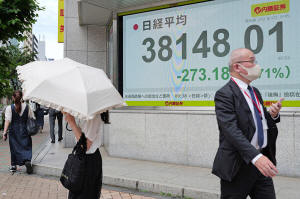World shares are mixed as markets shrug at latest China-US trade deal
[June 12, 2025] By
ELAINE KURTENBACH
TOKYO (AP) — World shares were trading mixed early Thursday after Wall
Street’s rally stalled, as investors appeared not to react much to the
results of the latest round of China-U.S. trade talks.
Germany's DAX lost 0.7% to 23,787.77 and the CAC 40 in Paris slipped
0.4% to 7,744.41.
Britain's FTSE 100 was nearly unchanged at 8,863.07.
The futures for the S&P 500 and the Dow Jones Industrial Average were
down 0.3%.
In Asian trading, Japan's Nikkei 225 lost 0.5% to 38,216.06.
Hong Kong’s Hang Seng sank 0.5% to 24,234.80, while the Shanghai
Composite index edged 0.1% lower to 3,404.66.
In South Korea, the Kospi gained 0.9% to 2,933.44, while Australia's
S&P/ASX 200 edged 0.1% higher to 8,604.50.
Taiwan's Taiex lost 0.8%.
On Wednesday, the S&P 500 fell 0.3% to 6,022.24 for its first loss in
four days. The Dow Jones Industrial Average was virtually unchanged at
42,865.77 after edging down by 1 point. The Nasdaq composite slipped
0.5% to 3,400.30.
Several Big Tech stocks led the way lower, and a 1.9% drop for Apple was
the heaviest weight on the market. It’s been listless this week after
unveiling several modest upcoming changes to the software that runs its
devices.
The action was stronger in the bond market, where Treasury yields eased
after a report suggested President Donald Trump’s tariffs are not
pushing inflation much higher, at least not yet.

U.S. consumers had to pay prices for food, gasoline and other costs of
living that were 2.4% higher overall in May than a year earlier. That
was up from April’s 2.3% inflation rate, but it wasn’t as bad as the
2.5% that Wall Street was expecting.
A fear has been that Trump’s wide-ranging tariffs could ignite an
acceleration in inflation, just when it had seemed to get nearly all the
way back to the Federal Reserve’s 2% target from more than 9% three
summers ago. It hasn’t happened, though economists warn it may take
months more to feel the full effect of Trump’s tariffs.
Trump said Wednesday that China will supply rare-earth minerals and
magnets to the United States, while his government will allow Chinese
students into U.S. universities in a deal that still needs an agreement
by him and by China’s leader. Trump also said that “President XI and I
are going to work closely together to open up China to American Trade.
This would be a great WIN for both countries!!!”
[to top of second column] |

People walk in front of an electronic stock board showing Japan's
Nikkei index at a securities firm Thursday, June 12, 2025, in Tokyo.
(AP Photo/Eugene Hoshiko)
 Investors are still hoping for a
more sweeping trade deal that would ease tensions between the
world’s two largest economies.
Hopes for such deals between the United States and countries around
the world have been one of the main reasons the S&P 500 has charged
nearly all the way back to its all-time high after dropping roughly
20% below a couple months ago. Without them, the fear is that
Trump’s high tariffs could drive the economy into a recession while
pushing inflation higher. The S&P 500 is now sitting 2% below its
record.
Tesla swung between gains and losses before finishing with a rise of
0.1% to continue its shaky run. It’s been recovering much of its big
losses taken last week after Elon Musk’s relationship with Trump
imploded, which in turn raised fears about a loss of business for
the electric-vehicle company. Musk on Wednesday backed away from
some of his earlier comments and said they went “too far.”
In the bond market, the yield on the 10-year Treasury eased to 4.41%
from 4.47% late Tuesday. Shorter-term yields, which more closely
track expectations for what the Federal Reserve will do with
overnight interest rates, fell more.
Wednesday’s better-than-expected reading on inflation raised
expectations along Wall Street that the Fed could cut its main
interest rate at least twice by the end of the year.
In other dealings early Thursday, U.S. benchmark crude oil lost 46
cents to $67.69 per barrel. Brent crude, the international standard,
shed 53 cents to $69.24 per barrel.
The U.S. dollar slipped to 143.90 Japanese yen from 144.60 yen. The
euro rose to $1.1518 from $1.1487.
All contents © copyright 2025 Associated Press. All rights reserved
 |